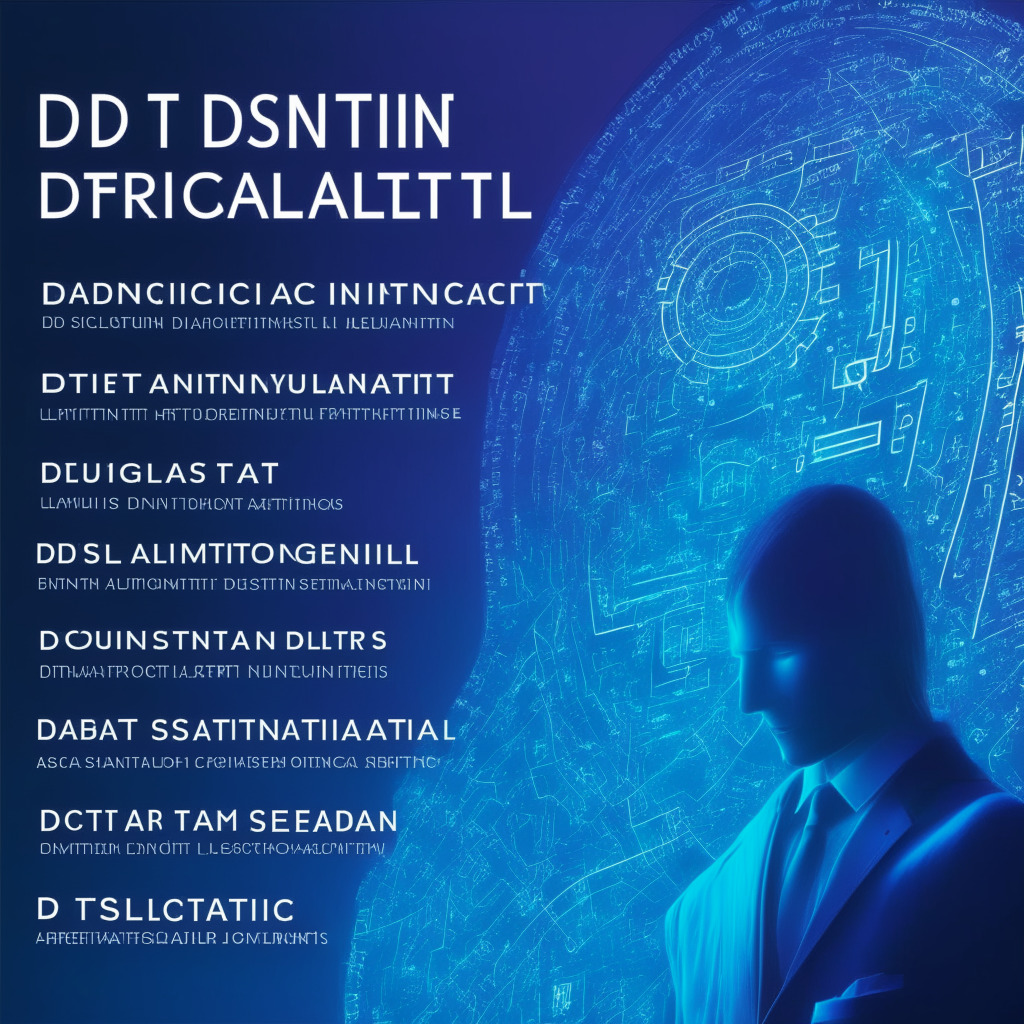Bitcoin and Ethereum face significant developments impacting price predictions due to the US SEC lawsuit, bankruptcy of FTX exchange, and BitGo’s acquisition deal. As clear regulation and reliable custody services are crucial, cryptocurrency prices remain sensitive to market changes.
Search Results for: Financial Services Agency
Moody’s Downgrades Coinbase: Analyzing the Impact, Future Prospects, and Investor Confidence
Moody’s downgrades Coinbase’s rating to “negative” amid the SEC’s legal action, impacting the crypto exchange’s operations and business model. Berenberg Capital regards Coinbase shares as “uninvestable,” while ARK Invest’s Cathie Wood sees regulatory scrutiny as a long-term positive. Coinbase’s future remains uncertain as the legal battle unfolds.
SEC Crackdown on Crypto Exchanges: Decentralized Finance Surges and Market Uncertainty Grows
The cryptocurrency market is facing increased uncertainty due to recent regulatory actions by the SEC against Binance and Coinbase. Consequent to crackdown on centralized exchanges, DeFi sector sees rapid growth. Investors keep a close eye on upcoming hearings and future developments as market adapts to regulatory challenges.
Luxembourg Pioneers Web3 Regulation: Balancing Blockchain Innovation and Market Competition
Luxemburg’s competition regulator, Autorité de la Concurrence, initiates a first-of-its-kind study to explore the relationship between blockchain-based products, services, and existing digital companies. The study aims to ensure competitive and well-functioning markets, assess competition, and identify potential anti-competitive practices within Web3 and blockchain-based firms.
Coinbase Faces Show Cause Orders: Implications for Crypto Industry and Investor Protection
Coinbase faces charges from 11 US states, including Alabama and California, for violating securities laws. These states allege that Coinbase operated unregistered securities exchanges, brokers, and clearing agencies. The crypto exchange now has 28 days to prove why it shouldn’t cease operations in these states.
Emergency SEC Motion on Binance.US: Protecting Assets or Stifling Innovation?
The SEC has filed an emergency motion to freeze assets held by Binance.US and its associated holding companies, alleging illicit behavior and citing the need for customer asset protection. This move raises questions about balancing regulatory oversight with innovation and growth within the cryptocurrency industry.
SEC Lawsuit Against Coinbase: Striking a Balance Between Innovation and Regulation
The SEC has filed a lawsuit against Coinbase, accusing the crypto exchange of operating as an unregistered broker, exchange, and clearing agency since 2019. This legal action raises concerns about potential financial regulation violations and prompts debates regarding regulatory compliance versus fostering innovation in the cryptocurrency industry.
XRP Holds Strong Above $0.50: Analyzing its Future amid Ripple’s Lawsuit Developments
XRP, the native cryptocurrency of the XRP Ledger, has maintained its position above $0.50, driven by positive developments in Ripple’s ongoing lawsuit against the SEC. Investors show increasing confidence in a positive outcome, potentially boosting the company’s payment business and generating greater demand for XRP. However, diversification and caution are essential in crypto investing.
P2P Payment Apps: Uncovering Hidden Risks and the Importance of FDIC Coverage
The US Consumer Financial Protection Bureau warns that funds stored in nonbank payment platforms, including those offering crypto services, may not be protected by federal deposit insurance coverage. With recent collapses involving major banks, consumers must exercise caution and understand potential risks when managing assets through online payment services.
CFTC’s Risk Management Revamp: Balancing Crypto Security and Innovation
The CFTC is considering a revamp of risk management rules in response to emerging technologies like digital assets and their associated risks. Commissioner Christy Goldsmith Romero emphasizes the need for updated regulations, striking a balance between protecting investors and fostering industry growth while dealing with cryptocurrency adoption.
UAE Central Bank’s Crypto Guidelines: Balancing Security and Innovation
The Central Bank of the UAE has issued new guidelines targeting anti-money laundering and counter-terrorism financing within cryptocurrencies and NFTs. These regulations apply to licensed financial institutions and emphasize the risks and legal obligations associated with dealing with cryptocurrencies.
Gemini’s Ireland Expansion, Copper-Bitget Partnership, and Bridging Global Crypto Regulation Gaps
Gemini selects Ireland as its European headquarters, while Copper partners with Bitget for off-exchange settlement solution. Coinmint sues Katena Computing and DX Corr, and China’s Zhengzhou drafts a policy for metaverse industry development. Regulations and adoption updates also feature.
Crypto Investment Firms: ESMA’s Concerns and the Quest for Transparency in the EU Market
The European Securities and Markets Authority (ESMA) expresses concerns over investment firms offering crypto alongside traditional finance products, potentially giving a false sense of security to consumers. This issue highlights the importance of transparency and regulatory awareness for both firms and investors in the crypto industry.
Shifting US Crypto Landscape: FINRA Approvals, Compliance, and Emerging Legal Trading Platforms
The Financial Industry Regulatory Authority (FINRA) approved its first broker-dealer with custody rights for digital assets securities, Prometheum Ember Capital LLC, and authorized OTC Markets Group for crypto securities trading. Prometheum Capital’s platform, built to comply with SEC regulations, aims to challenge the industry’s claims of a lack of a clear US compliance path.
China’s NFT Warning: A New Regulatory Crackdown Looming Over the Digital Collectible Market?
China’s Supreme People’s Procuratorate warns about non-fungible tokens (NFTs), relating them to banned virtual assets. The agency calls for legal risk research and discusses the inability of NFT owners to fully “enjoy” digital art ownership. This perspective challenges the NFT understanding in the Chinese market.
Ripple Labs Case: Balancing Innovation, Regulation, and Cryptocurrency Adoption
Ripple Labs secures a win in its legal battle with the SEC, as Judge Torres denies the SEC’s request to seal Hinman speech documents. This case highlights the debate on cryptocurrency regulations, with advocates arguing for safety, transparency, and legitimacy, while critics warn of overregulation stifling innovation.
SEC Denies Coinbase’s Call for Crypto Clarity: Debating Industry Demands vs Regulatory Caution
The SEC has rejected Coinbase’s request for regulatory clarity in the crypto industry, stating that no statute requires them to act within a specific timeline. This highlights the ongoing struggle between the crypto industry’s demands for clarity and the cautious stance taken by financial authorities like the SEC.
SEC’s LBRY Lawsuit: Protecting Investors or Hindering Crypto Innovation?
The SEC recently modified the penalty in the LBRY lawsuit, attracting criticism for not protecting individual investors. Though fines were reduced due to LBRY’s inability to pay, questions arise about the regulatory approach’s fairness and effectiveness for cryptocurrencies, highlighting the struggle to balance investor protection and market innovation.
Coinbase’s Global Advisory Council: Navigating Crypto Regulations with Former US Lawmakers
Coinbase launches its Global Advisory Council, including former US lawmakers Patrick Toomey, Tim Ryan, and Patrick Maloney, to navigate crypto regulations. The council aims to collaborate with regulators, shaping the future of cryptocurrency and bridging the gap between regulators and innovators.
Balancing Crypto Regulation and Innovation: Can the SEC Adapt?
The SEC’s heavy-handed enforcement in the crypto market faces criticism, with Ripple’s Chief Legal Officer, Stuart Alderoty, calling it a constitutional issue, not a crypto one. Striking a balance between regulation and fostering innovation remains a hotly contested subject.
SEC & Congress Clash: Crypto Platforms Registration, Balancing Regulation & Innovation
The SEC faces challenges in crafting digital asset regulations that protect investors without stifling innovation. Lawmakers express frustration over the regulatory body’s lack of clarity, while the future role of the SEC and Congress in shaping crypto regulations remains uncertain.
Allegations of SEC’s Selective Enforcement: Unveiling Conflicts in Crypto Market Regulation
EMPOWR filed a complaint against the SEC alleging selective enforcement on crypto market businesses and potential conflicts of interest among high-level officials. This follows the SEC’s failure to comply with a Freedom of Information Act request, further highlighting the agency’s inability to provide clear regulations and transparency for the growing crypto industry.
SEC’s Crypto Custody Rule: Controversy Engulfs Traditional Finance, Crypto Sector & Regulators
The SEC’s proposal requiring investment firms to safeguard client assets, including cryptocurrencies, with approved custodians faces pushback from organizations like JPMorgan and the Small Business Administration. Critics argue the rule is “illegal, infeasible, and dangerous,” with concerns over unique custody logistics for crypto assets and potential limitations on service options.
Reintroduction of Digital Asset Anti-Money Laundering Act: National Security vs Crypto Privacy
Sen. Elizabeth Warren plans to reintroduce the Digital Asset Anti-Money Laundering Act, aiming to curb money laundering and terrorist financing in crypto. The bill focuses on law enforcement and national security, extending KYC requirements and prohibiting transactions with digital asset mixers.
Biden’s Blockchain Focus: Digital Identity, DLT Advancements, and Balancing Privacy
The US government has emphasized the development of critical and emerging technologies, including digital identity infrastructure and distributed ledger technologies (DLT). As blockchain gains significance in the economic landscape, challenges arise in balancing innovation and privacy, while aiming to bolster US competitiveness and maintain a secure digital environment.
SEC Withdraws Digital Asset Definition: Clarity Eludes Crypto Regulation
The SEC recently removed the first formal definition of “digital asset” from its latest hedge fund rule, explaining that the term is still under consideration. This comes amidst the commission’s ongoing efforts in addressing crypto regulation and integrating digital assets into existing rules. However, the lack of an official definition leaves room for debate among industry stakeholders.
Gensler’s SEC Hearing: Symbolic Pressure, No Crypto Clarity, and Partisan Divisions Revealed
Gary Gensler, the United States Securities Exchange Commission (SEC) chair, recently faced the U.S. House […]
Nigeria’s SEC Flirts with Tokenized Assets: A Step Towards Crypto Acceptance or Just Teasing the Market?
Nigeria’s Securities and Exchange Commission (SEC) appears to be taking a step towards embracing the […]



























